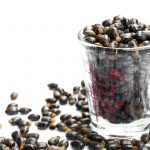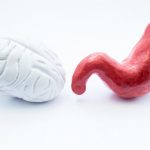IGF-1 and HER2+ Breast CA: A New Study Raises Questions
JACOB SCHOR, ND, FABNO
Many of us have advocated that cancer patients should practice caloric restriction to lower insulin-like growth factor-1 (IGF-1). A recent study brings this premise into question. In April 2020, Yiwei Tong and colleagues reported data on IGF-1 in HER2-positive breast cancer patients that differed from what we would have predicted.1
Tong analyzed data from 679 breast cancer patients who were positive for human epidermal growth factor receptor-2 (HER2+). (Positivity for HER2 suggests greater production of the HER2 protein and a more aggressive cancer.) Unexpectedly, IGF-1 levels were not associated with recurrence-free survival (RFS). This was in contrast to our thinking that lower IGF-1 would improve outcomes.
When Tong divided these women by weight, the analysis changed and revealed a clear association between IGF-1 and RFS. In normal-weight women (BMI <24), high IGF-1 was associated with superior 4-year RFS (91.1% vs 85.0%; HR 0.53) compared to women with low IGF-1. However, in overweight patients (BMI >24), high IGF-1 correlated with poorer RFS (88.3 vs 95.7%; HR 3.20).1
High IGF-1 levels were associated with better overall survival (OS) in the entire cohort (HR 0.26, 95% CI, p=0.044) and in the non-overweight population (HR 0.15; 95% CI, p=0.005).
Treatment with trastuzumab only slightly (but non-significantly) improved OS, from 96.7% to 97.7%. Significantly better 4-year OS was seen in the high IGF-1 group compared to the low IGF-1 group (99.2 vs 95.8%). High IGF-1 level was associated with improved OS in normal-weight patients (99.4 vs 93.7%) but not in overweight patients (98.7 vs 98.9%).1
IGF-1, BMI & Cancer
Our belief that IGF-1 correlates with cancer risk goes back decades. High IGF-1 concentrations have been associated with increased risk of cancer,2 including prostate,3,4 colorectal,5 multiple myeloma,6 breast,7,8 lung,9 thyroid,10 bone, brain, and ovary.11 In people with a cancer history, low IGF-1 levels appear to predict longer survival.12 Individuals born with a genetic disorder called Laron syndrome, which reduces IGF-1 effects, are short in stature but have low cancer risk.13
This thinking has justified a range of dietary interventions. Caloric restriction and reduced intake of animal protein lower IGF-1 levels, so we have advocated fasting and vegetarian diets.14
Tong’s data suggest that lowering IGF-1 is only helpful in overweight women. For normal-weight women, a higher IGF-1 appears preferable. If we are to go by these data, overweight women should fast and/or eat a low-protein diet if they have high IGF-1, but normal-weight women should follow a high-animal-protein diet if they have low IGF-1. In other words, dietary recommendations should now take into account BMI and IGF-1 levels.
Tong’s data are specific to HER2+ breast cancer; whether they apply to other cancers is unclear. HER2 can be overexpressed in gastric, ovarian, and prostate cancers.15 In the United States, 70% of adults and 37% of adolescents are overweight or obese.16
Tong’s results hint that other growth promoters outweigh the effect of IGF-1, at least in HER2+ cancers. Tong isn’t the first to report a BMI/IGF-1 interaction in breast cancer. In 2013, Catherine Duggan reported that increased IGF-1 levels were associated with a 2-fold greater risk of death in breast cancer patients with a BMI >25, compared to lean patients.17 Duggan’s women were not limited by HER2 status; however, her findings suggest that a similar division by BMI might apply to all breast cancer patients.
As to why obesity has such a profound impact, Tong suggests, “One possible key factor was leptin, a cytokine secreted mainly by adipoctyes and closely related to body weight and body fat.”
Leptin’s Key Role in CA
Obesity is a major risk for cancer, second only to smoking.18 Obesity causes a chronic inflammatory state resembling chronic injury,19 and our thinking that “chronic injury” and the body’s ongoing attempts at repair can trigger cancer is popular. Yet obesity can also confer benefit.
In a number of cancers, obesity increases risk, speeds progression, and then, oddly, provides a survival advantage. This phenomenon is referred to as the “obesity paradox.”20,21 Jennifer McQuade reported in Lancet Oncology in 2018 that checkpoint inhibitor drugs, which target PD-1 (a checkpoint protein on T-cells), work better in obese patients than in normal-weight ones.22 In advanced melanoma, males who were overweight lived 27 months, as compared to normal-weight men who survived only 14 months. McQuade’s assumption had been that obesity should worsen prognosis, not improve it.22
Tumors grow faster in obese mice and people because their T-cells are “exhausted,” no longer able to limit cancer growth.23 This exhaustion appears to be driven by leptin, the “obesity hormone.” Leptin stops T-cells from proliferating, and they slack off from secreting immune-stimulating proteins. T-cells in the obese also display more PD-1, which allows cancer cells to suppress them more easily.23,24 PD-1 inhibitor drugs shake the T-cells awake, leading to a renewed immune defense. Thus, in obese people, who have higher levels of leptin, PD-1 inhibitor drugs have a greater impact.25
Reports now link obesity with improved overall survival and progression-free survival in patients treated with immunotherapy for metastatic melanoma, bladder cancer, colorectal cancer, lung cancer, and renal cell carcinoma.16,26-30
Still, leptin activates many cancer-promoting pathways31 in breast cancer and is considered the “… most important mediator for obesity-breast cancer link that promotes tumor initiation, development, growth, and metastasis.”32 Yet, leptin is specifically associated with improved outcome in breast cancer. In 2019, Yan Kong et al reported that breast cancer patients who had a complete response to chemo treatment had higher leptin levels and more leptin receptors than patients whose disease progressed.33
The role played by leptin is accentuated in HER2+ cases. Fiorio et al reported in 2008 that HER2 and the leptin receptor are co-expressed “in all studied breast cancer cell lines” and suggested that this co-expression might “enhance” HER2 activity.34 IGF-1 and leptin interact to modulate HER2 signaling pathways in ways that are not yet fully understood.35
In human breast cancer cell lines, leptin increases HER2 protein levels and enhances the responsiveness of HER2+ breast cancer cells to other growth-promoting chemicals.36 It is possible that leptin and IGF-1 have a greater impact on HER2+ cancers.
The theory promoted by proponents of calorie-restricted diets has been that such diets fight cancer by decreasing IGF-1. Caloric restriction lowers IGF-1, but it also decreases leptin. A 2015 human trial demonstrated that 8 weeks of caloric restriction dropped leptin by 50%.37 Fasting, by lowering leptin, may wake those exhausted T-cells and stimulate immune function.
Summary
Multiple hormones interact to promote breast cancer growth; examining them individually doesn’t work. We need a better understanding of the complex interactions between leptin, IGF-1, IGF-binding protein-3, insulin, and estrogen.38
We should consider both leptin and IGF-1 in HER2-positive cancers. Leptin may be a driver of cancer that we want low for prevention but want high during treatment.
References:
- Tong Y, Wu J, Huang O, et al. IGF-1 Interacted With Obesity in Prognosis Prediction in HER2-Positive Breast Cancer Patients. Front Oncol. 2020;10:550.
- Cromie WJ. Growth Factor Raises Cancer Risk. April 22, 1999. The Harvard Gazette. Available at: http://www.news.harvard.edu/gazette/1999/04.22/igf1.story.html. Accessed September 2, 2020.
- Nimptsch K, Platz EA, Pollak MN, et al. Plasma insulin-like growth factor 1 is positively associated with low-grade prostate cancer in the Health Professionals Follow-up Study 1993-2004. Int J Cancer. 2011;128(3):660-667.
- Chan JM, Stampfer MJ, Ma J, et al. Insulin-like growth factor-I (IGF-I) and IGF binding protein-3 as predictors of advanced-stage prostate cancer. J Natl Cancer Inst. 2002;94(14):1099-1106.
- Wei EK, Ma J, Pollak MN, et al. A prospective study of C-peptide, insulin-like growth factor-I, insulin-like growth factor binding protein-1, and the risk of colorectal cancer in women. Cancer Epidemiol Biomarkers Prev. 2005;14(4):850-855.
- Birmann BM, Tamimi RM, Giovannucci E, et al. Insulin-like growth factor-1- and interleukin-6-related gene variation and risk of multiple myeloma. Cancer Epidemiol Biomarkers Prev. 2009;18(1):282-288.
- Kang HS, Ahn SH, Mishra SK, et al. Association of polymorphisms and haplotypes in the insulin-like growth factor 1 receptor (IGF1R) gene with the risk of breast cancer in Korean women. PLoS One. 2014;9(1):e84532.
- Kaaks R, Johnson T, Tikk K, et al. Insulin-like growth factor I and risk of breast cancer by age and hormone receptor status-A prospective study within the EPIC cohort. Int J Cancer. 2014;134(11):2683-2690.
- Cao H, Wang G, Meng L, et al. Association between circulating levels of IGF-1 and IGFBP-3 and lung cancer risk: a meta-analysis. PLoS One. 2012;7(11):e49884.
- Schmidt JA, Allen NE, Almquist M, et al. Insulin-like growth factor-I and risk of differentiated thyroid carcinoma in the European Prospective Investigation into Cancer and Nutrition. Cancer Epidemiol Biomarkers Prev. 2014;23(6):976-985.
- Weroha SJ, Haluska P. The insulin-like growth factor system in cancer. Endocrinol Metab Clin North Am. 2012;41(2):335-350, vi.
- Milman S, Atzmon G, Huffman DM, et al. Low insulin-like growth factor-1 level predicts survival in humans with exceptional longevity. Aging Cell. 2014;13(4):769-771.
- Shevah O, Laron Z. Patients with congenital deficiency of IGF-I seem protected from the development of malignancies: a preliminary report. Growth Horm IGF Res. 2007;17(1):54-57.
- Levine ME, Suarez JA, Brandhorst S, et al. Low Protein Intake Is Associated with a Major Reduction in IGF-1, Cancer, and Overall Mortality in the 65 and Younger but Not Older Population. Cell Metab. 2014;19(3):407-417.
- Tai W, Mahato R, Cheng K. The role of HER2 in cancer therapy and targeted drug delivery. J Control Release. 2010;146(3):264-275.
- Cheng M, Gunderman RB. Is obesity a disease?-the evolving concepts, cancer paradox and association with improved cancer immunotherapy efficacy. Hepatobiliary Surg Nutr. 2020;9(2):247-249.
- Duggan C, Wang CY, Neuhouser ML, et al. Associations of insulin-like growth factor and insulin-like growth factor binding protein-3 with mortality in women with breast cancer. Int J Cancer. 2013;132(5):1191-1200.
- Blumenthal D, Seervai S. Rising Obesity in the United States Is a Public Health Crisis. April 24, 2018. The Commonwealth Fund. Available at: https://www.commonwealthfund.org/blog/2018/rising-obesity-united-states-public-health-crisis. Accessed October 9, 2020.
- Iyengar NM, Gucalp A, Dannenberg AJ, Hudis CA. Obesity and Cancer Mechanisms: Tumor Microenvironment and Inflammation. J Clin Oncol. 2016;34(35):4270-4276.
- Greenlee H, Unger JM, LeBlanc M, et al. Association between Body Mass Index and Cancer Survival in a Pooled Analysis of 22 Clinical Trials. Cancer Epidemiol Biomarkers Prev. 2017;26(1):21-29.
- Lennon H, Sperrin M, Badrick E, Renehan AG. The Obesity Paradox in Cancer: a Review. Curr Oncol Rep. 2016;18(9):56.
- McQuade JL, Daniel CR, Hess KR, et al. Association of body-mass index and outcomes in patients with metastatic melanoma treated with targeted therapy, immunotherapy, or chemotherapy: a retrospective, multicohort analysis. Lancet Oncol. 2018;19(3):310-322.
- Kaiser J. Obesity gives unexpected boost to anticancer drugs. Science. 2018;362(6416):734. Available at: https://www.sciencemagazinedigital.org/sciencemagazine/16_november_2018/MobilePagedReplica.action?pm=2&folio=735#pg19. Accessed September 2, 2020.
- Woodall MJ, Neumann S, Campbell K, et al. The Effects of Obesity on Anti-Cancer Immunity and Cancer Immunotherapy. Cancers (Basel). 2020;12(5):1230.
- Wang Z, Aguilar EG, Luna JI, et al. Paradoxical effects of obesity on T cell function during tumor progression and PD-1 checkpoint blockade. Nat Med. 2019;25(1):141-151.
- Naik GS, Waikar SS, Johnson AEW, et al. Complex inter-relationship of body mass index, gender and serum creatinine on survival: exploring the obesity paradox in melanoma patients treated with checkpoint inhibition. J Immunother Cancer. 2019;7(1):89.
- Renfro LA, Loupakis F, Adams RA, et al. Body mass index is prognostic in metastatic colorectal Cancer: pooled analysis of patients from first-line clinical trials in the ARCAD database. J Clin Oncol. 2016;34(2):144-150.
- Martini DJ, Shabto JM, Liu Y, et al. Body mass index (BMI) and toxicities and association with clinical outcomes (CO) in metastatic renal cell carcinoma (mRCC) patients (pts) treated with cabozantinib (cabo). J Clin Oncol. 2019;37(7):613.
- Lalani AA, Xie W, Flippot R, et al. Impact of body mass index (BMI) on treatment outcomes to immune checkpoint blockade (ICB) in metastatic renal cell carcinoma (mRCC). J Clin Oncol. 2019;37(7):566.
- Cortellini A, Bersanelli M, Buti S, et al. A multicenter study of body mass index in cancer patients treated with anti-PD-1/PD-L1 immune checkpoint inhibitors: when overweight becomes favorable. J Immunother Cancer. 2019;7(1):57.
- Cirillo D, Rachiglio AM, la Montagna R, et al. Leptin signaling in breast cancer: an overview. J Cell Biochem. 2008;105(4):956-964.
- Atoum MF, Alzoughool F, Al-Hourani H. Linkage Between Obesity Leptin and Breast Cancer. Breast Cancer (Auckl). 2020;14:1178223419898458. doi:10.1177/1178223419898458.
- Kong Y, Dong Q, Ji H, et al. The Effect of the Leptin and Leptin Receptor Expression on the Efficacy of Neoadjuvant Chemotherapy in Breast Cancer. Med Sci Monit. 2019;25:3005-3013.
- Fiorio E, Mercanti A, Terrasi M, et al. Leptin/HER2 crosstalk in breast cancer: in vitro study and preliminary in vivo analysis. BMC Cancer. 2008;8:305.
- Ray A. Tumor-linked HER2 expression: association with obesity and lipid-related microenvironment. Horm Mol Biol Clin Investig. 2017;32(3):/j/hmbci.
- Giordano C, Vizza D, Panza S, et al. Leptin increases HER2 protein levels through a STAT3-mediated up-regulation of Hsp90 in breast cancer cells. Mol Oncol. 2013;7(3):379-391.
- Camps SG, Verhoef SP, Westerterp KR. Leptin and energy restriction induced adaptation in energy expenditure. Metabolism. 2015;64(10):1284-1290.
- Schmidt S, Monk JM, Robinson LE, Mourtzakis M. The integrative role of leptin, oestrogen and the insulin family in obesity-associated breast cancer: potential effects of exercise. Obes Rev. 2015;16(6):473-487.

Jacob Schor, ND, FABNO graduated from NCNM in 1991 and has practiced in Denver, CO, ever since. He has been active in state association politics, taking his turn as president of the Colorado Association of Naturopathic Doctors and Legislative Chair. Dr Schor has also held leadership positions in the Oncology Association of Naturopathic Physicians, served on the AANP Board of Directors, and chaired the AANP’s speaker selection committee. For the past decade he has been the Associate Editor of the Natural Medicine Journal, and is a regular contributor to the Townsend Letter.










